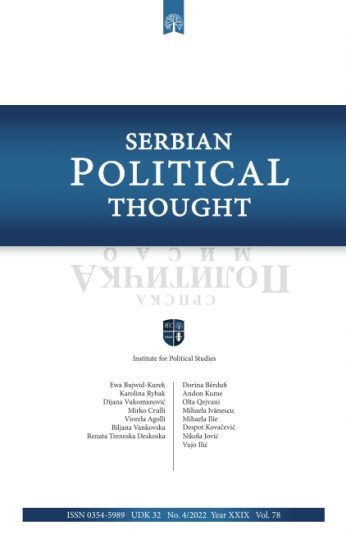Main topic
Serbian Political Thought
Building Nations Instead of Peace(s): the Bosnian Metaconflict
Abstract
The author argues that a significant problem with the ongoing international administration in Bosnia is an epistemic hegemony of the West, which has further deformed Bosnian conflicted society through the establishment of approaches that resemble Western colonialism/imperialism. Although illiberal and lacking local legitimacy and accountability, this informal trusteeship has adopted discourses of liberalism and Europeanness to justify itself in front of the local and global public. Nevertheless, that caused local resistance — mostly in the form of ethnopolitics. Political elites, both internal and external, have framed post-war society of Bosnia and Herzegovina as a ‘continuation of war by other means’, which resulted in the construction of mutually contested national identities and ethnicized peaces. Therefore, the author uses critical approach to peacebuilding, interpretative methodology and discourse analysis to argument his general hypothesis.
References
- “Cerić: Ukinuti Dejtonski sporazum”, B92, 4 August 2012, [online] Available at: http://www.b92.net/info/vesti/index.php?yyyy=2012&mm=09&dd=04&nav_category=167&nav_id=640317 [Accessed 12 September 2012].
- “Čović: Federacija BiH je entitet bošnjačkog naroda”, Nezavisne novine, 26 September 2012, [online]. Available at: http://www.nezavisne.com/novosti/bih/Covic-Federacija-BiH-je-entitet-bosnjackog-naroda/160221 [Accessed 16 July 2013].
- “Čović: Ne vidim razlog da se osporava referendum”, Nezavisne novine, 23 August 2016, [online]. Available at: http://www.nezavisne.com/novosti/bih/Covic-Ne-vidim-razlog-da-se-osporava-referendum/384147 [Accessed 23August 2016].
- “Dodik u Beogradu: Bez razloga dajete veću ulogu Sarajevu nego Banjoj Luci”, Oslobođenje, 15 May 2013, [online]. Available at: from http://www.oslobodjenje.ba/vijesti/bih/dodik-srbi-imaju-dvije-drzave-srbiju-i-republiku-srpsku [Accessed 16 February 2014].
- “Dodik: Bez obzira na sve referendum će biti održan”, Nezavisne novine, 16 August 2016, [online]. Available at: http://www.nezavisne.com/novosti/bih/Dodik-Bez-obzira-na-sve-referendum-ce-biti-odrzan/383267 [16 August 2016].
- “Izetbegović pisao ambasadorima PIC-a i Inzku: Zaustavite rušenje Dejtona, Dodik nas vodi u bezakonje i haos”, Oslobođenje, 29 August 2016, [online]. Availbale at: http://www.oslobodjenje.ba/vijesti/bih/izetbegovic-pisao-ambasadorima-pic-a-i-inzku-zaustavite-rusenje-dejtona-dodik-nas-vodi-u-bezakonje-i-haos/178710 [Accessed 29 August 2016].
- Baros, (2010) The High Representative for Bosnia and Herzegovina: A Requiem for Legality, [online] Available at: http://www.ejiltalk.org/the-high-representative-for-bosnia-and-herzegovina-a-requiem-for-legality/ [Accessd 1 March 2015].
- Belloni, R. (2001) “Peacebuilding in Bosnia”, Journal of Peace Research, 38 (2): pp. 163-180.
- Bošković, (2011) “Happy Holidays for Whom: Ethnic Diversity and Politics of Regulation of Public Holidays in BiH”. In Sarajlić E., Marko D. (eds.), “State or Nation? The Challenges of Political Transition in Bosnia and Herzegovina”, Sarajevo: Centar za interdisciplinarne postdiplomske studije. pp. 127-150.
- Brubaker, (2002) „Ethnicity without groups”, Arch. europ. sociol, 43 (2): pp. 163-189.
- Chandler, D. (2006) “State-Building in Bosnia: The Limits of ‘Informal Trusteeship’”, International Journal of Peace Studies, 11 (1): pp. 17-38.
- Franks, J., & Richmond, P. (2008) “Coopting Liberal Peace-building Untying the Gordian Knot in Kosovo”, Cooperation and Conflict: Journal of the Nordic International Studies Association, 43(1): pp. 81-103.
- Gibbs, D. N. (2009) “First Do No Harm: Humanitarian Intervention and the End of Yugoslavia”. Nashville: Vanderbilt University Press.
- Gilbert, A. (2012) “Legitimacy Matters: Managing the Democratization Paradox of Foreign State-Building in Bosnia-Herzegovina”, Südost-Europa: Zeitschrift für Politik und Gesellschaft, 60 (4): pp. 483-496.
- Gilbert, A. (2013) “History, War, and the Poverty of the Political Imagination in Bosnia-Herzegovina”. In Zivkovic M. & Pavlovic S. (eds.), “Transcending Fratricide. Political Mythologies, Reconciliations, and the Uncertain Future in the former Yugoslavia”, Sinzheim: Nomos. pp. 165188.
- Glover J., “King Paddy”, The Guardian, 11 October 2002, [online]. Available at: http://www.theguardian.com/politics/2002/oct/11/foreignpolicy. uk [Accessed 26 February 2016].
- Hobden, S., Hobson, J. M. (2012), “Historical Sociology of International Relations”. Cambridge: Cambridge University Press.
- Lemay-Hebert, N. (2009) “State-Building from the Outside-In: UNMIK and Its Paradox”, Journal of Public & International Affairs, 20: pp. 65-90.
- MacMillan, J. (2013) “Intervention and the ordering of the modern world”, Review of International Studies, 39: pp. 1039-1056.
- Majstorović, (2007) “Construction of Europeanization in the High Representative’s discourse in Bosnia and Herzegovina“, Discourse & Society, 18(5): pp. 627-651.
- Mann, M. (1986) “The sources of social power: A history of power from the beginning to A.D. 1760”. Cambridge: Cambridge University Press.
- Martinović, (2012) “Valentin Inzko — ‘Bolesnik s Miljacke’”, Političke analize, 10: pp. 10-16.
- Newman, E. (2009) “‘Liberal’ peacebuilding debates” In Newman E., Paris R., Richmond O. (eds.), “New perspectives on liberal peacebuilding”, Tokyo: United Nations University Press. pp. 26-53.
- Paris, R. (2009). “Does liberal peacebuilding have a future?”, In Newman E., Paris R., Richmond O. (eds.), New perspectives on liberal peacebuilding, Tokyo: United Nations University Press. pp. 97-111.
- Pehar, (2012) “Bosna i Hercegovina kao Veleposlanstvo Visokog predstavnika republikanska kritika”, Političke analize, 10: pp. 3-9.
- Pehar, D. (2014) “Zašto Visoki predstavnik s ‘Bonskim’ mandatom nikada nije značio pozitivni pomak za Bosnu i Hercegovinu: četiri refleksije”, [online]. Available at: http://www.idpi.ba/pehar/ [Accessed 26 February 2016].
- Peter, M. (2011) “The Shifting Contours of International State-building Practices in Bosnia and Herzegovina”. In Sarajlić , Marko D. (eds.), “State or Nation? The Challenges of Political Transition in Bosnia and Herzegovina”, Sarajevo: Centar za interdisciplinarne postdiplomske studije. pp. 39-64.
- Petrović, T. (2012) “Yuropa: jugoslovensko nasleđe i politike budućnosti u postjugoslovenskim društvima“. Beograd: Fabrika knjiga.
- Richmond, P (2008) “Peace in International Relations”. London: Routledge.
- Richmond, O. P (2009) “Beyond liberal peace? Responses to ‘backsliding”. In Newman E., Paris R., Richmond O. (eds.), New perspectives on liberal peacebuilding, Tokyo: United Nations University Press. pp. 55-77.
- Richmond, P (2012) “A Pedagogy of Peacebuilding: Infrapolitics, Resistance, and Liberation”, International Political Sociology, 6: 115-131.
- Richmond, P (2014) “Failed Statebuilding: Intervention and the Dynamics of Peace Formation”. New Haven: Yale University Press.
- Sarajlić, (2011) “Between State and Nation: Bosnia and Herzegovina and the Challenge of Political Analysis”. In Sarajlić E., Marko D. (eds.), State or Nation? The Challenges of Political Transition in Bosnia and Herzegovina, Sarajevo: Centar za interdisciplinarne postdiplomske studije. pp. 9-20.
- Tepšić, , Džuverović, N. (2018) “Bosnia and Herzegovina”. In Giessmann H. J., Mac Ginty R. (eds), Research Handbook on Political Transition, London: Edward Elgar (submitted for publication).
- Toal, G. (2013) “‘Republika Srpska will have a referendum’: the rhetorical politics of Milorad Dodik”, Nationalities Papers: The Journal of Nationalism and Ethnicity, 41 (1): 166-204.

